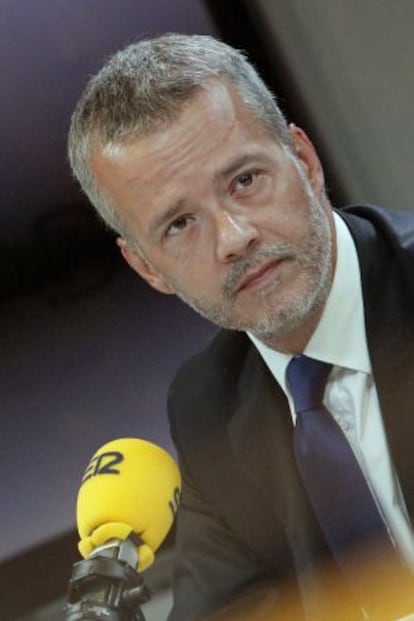Prosecutor in the dock over 15-M protest violence
Interior Minister Antonio Camacho under fire from critics of heavy-handed policing while security force union lodges complaint over alleged lack of support
Antonio Camacho is considered a serious prosecutor who has recently found himself in a damned-if-you-do-damned-if-you-don't situation. The interior minister has come under fire for over-zealous action by some police officers during last month's anti-papal demonstration held in Madrid by atheists and others who were against using public resources for World Youth Day 2011.
On Thursday, the police's biggest union, UFP, named him in a complaint it filed with the Luxembourg-based European police umbrella organization EuroCOP, alleging that the government has been treating 15-M Movement protestors a lot better than its own officers.
Demanding that their duties should be dictated by the courts and not by government officials, the UFP has charged the Socialist administration with "inaction" when it comes to face-to-face confrontations with activists.
Despite the flak he has been taking, Camacho, 46, is highly experienced and was considered the best option by Prime Minister José Luis Rodríguez Zapatero to run the ministry during the final months of the current Socialist administration after his predecessor, Alfredo Pérez Rubalcaba, resigned to head the party's slate in the November 20 general election.
Many have placed their faith in him, believing that he would carry on the same policies of Rubalcaba, with whom he has worked hand and hand with over the last five years.
But with the recent protests across Madrid, some wonder whether Camacho has actually taken a different stance than the non-confrontational Rubalcaba who once warned that the "police are there to resolve problems, not create them."
On August 17, eight people were arrested and 11 were injured during a violent confrontation between pilgrims who came to see Pope Benedict XVI for World Youth Day and anti-papal protestors.
Many criticized the police for dealing too strongly with the protestors, including physically assaulting them before making arrests. In a radio interview afterwards, Camacho denied he had taken a more passive approach with the 15-M Movement than with the papal demonstrators.
He said it was unfair to blame the officers for the behavior of "a few radical elements" that tried to start trouble. "We cannot allow any violent incidents, and when they occur, that's when we start making arrests," he said.
But as he defends the police action, some officers are complaining that he and the government have not done enough to back them when it came to dealing with dislodging the 15-M Movement members from the Puerta del Sol.
In its complaint, the UFP union said that "the police are not to be blamed for anything" because officers work "endless shifts, endure all sorts of harassment, double services and provide security to all those who want to circulate freely in the streets as is their right, but which is being prevented day after day, in clear violation of the law."
The UPN said that neither the Interior Ministry nor the government's delegate in Madrid have given them precise instructions on how to deal with the protestors. Both Camacho's supporters and detractors agree on one thing: he is "very serious, discreet and professional."
"I think being a prosecutor has helped him understand how this place works," a top ministry official told EL PAÍS back in July after he was named to fill Rubalcaba's shoes.
Zapatero has said privately that Camacho was one of the key figures behind Rubalcaba in the successive blows made against ETA over the past three years. When he came to the Interior Ministry seven years ago, the Madrid native wasn't a politician. In fact the man who selected him to be his deputy, then-Interior Minister José Antonio Alonso, wasn't a politician at the time, either. But now Camacho has confirmed that he will be on the Socialist slate in the upcoming general elections.
In his radio interview, Camacho said he didn't believe the so-called Faisán case - the court inquiry into the alleged derailing of a 2006 police investigation into a group of ETA extortionists - would affect his personal or political standing.
Camacho's name surfaced in the initial court inquiry when it was learned that, on the day the police were going to make the arrests, he had held a series of phone calls with Police Commander Víctor García Hidalgo, now indicted in the case.
The opposition Popular Party (PP) had demanded that Camacho not be appointed interior minister because of his involvement. But High Court Judge Pablo Ruz, who is presiding over the case, decided not to subpoena Camacho to testify because he considered "irrelevant" the phone conversations with García Hidalgo.
For his part, Camacho said he was concerned how the PP used a routine police issue as a political weapon against the entire Socialist government.

Tu suscripción se está usando en otro dispositivo
¿Quieres añadir otro usuario a tu suscripción?
Si continúas leyendo en este dispositivo, no se podrá leer en el otro.
FlechaTu suscripción se está usando en otro dispositivo y solo puedes acceder a EL PAÍS desde un dispositivo a la vez.
Si quieres compartir tu cuenta, cambia tu suscripción a la modalidad Premium, así podrás añadir otro usuario. Cada uno accederá con su propia cuenta de email, lo que os permitirá personalizar vuestra experiencia en EL PAÍS.
¿Tienes una suscripción de empresa? Accede aquí para contratar más cuentas.
En el caso de no saber quién está usando tu cuenta, te recomendamos cambiar tu contraseña aquí.
Si decides continuar compartiendo tu cuenta, este mensaje se mostrará en tu dispositivo y en el de la otra persona que está usando tu cuenta de forma indefinida, afectando a tu experiencia de lectura. Puedes consultar aquí los términos y condiciones de la suscripción digital.








































